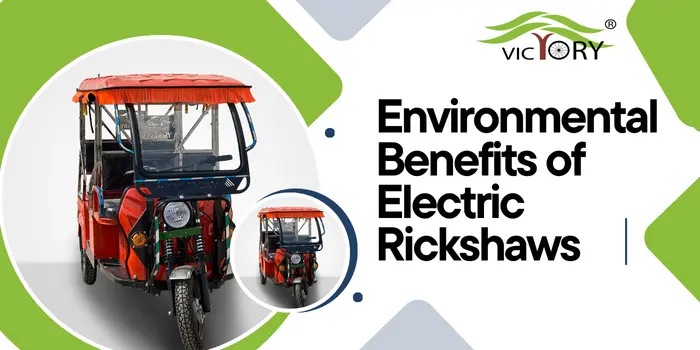Electric rickshaws AKA E-Rickshaws are getting very popular day to day in both urban and rural areas as the new generation of eco-friendly auto-rickshaws. Electric vehicles (EVs) are playing a key role in the worldwide push for lower carbon emissions and cleaner air, as environmental sustainability becomes more of an imperative. Especially the E-Rickshaws, providing an eco-friendly and cleaner alternative to reduce pollution from burning fossil fuels in internal combustion engines have a positive impact on the environment thereby improving urban infrastructure as well as leading to good public health. In this informative article, we are going to learn about the environmental advantages of battery-operated Rickshaws and how they help in a greener tomorrow. Even in this article, you can learn the Environmental Benefits of Electric Rickshaws.
What Are The Environmental Benefits of Electric Rickshaws?
Below we have noted the environmental benefits of E Rickshaws. So read carefully:

Reduction in Air Pollution
Reduced air Pollution — Perhaps one of the biggest eco-friendly advantages that electric rickshaws offer is a much-reduced rate of pollution. Conventional auto-rickshaws are gas guzzlers — they release toxic fumes in the form of carbon monoxide (CO), nitrogen oxides and particulate matter on burning petrol/diesel. These emissions are bad for the air quality and greatly harm our health, especially in places where cities have become immense wastelands.
E-Rickshaws: These are powered by an electric battery, so they have zero tailpipe emissions. Due to no exhaust gases being emitted, E-Rickshaws contribute a lot in reducing air pollution making them the best alternative for urban usage. Also, research suggests that the replacement of conventional rickshaws with E-Rickshaws is likely to reduce air pollution, especially one hundred pollutants, thus assisting in improving urban areas’ air quality and potentially mitigating respiratory diseases.
Lower Carbon Footprint
Battery rickshaws are contributing to reducing the carbon footprint of transportation as a whole. Electric vehicles also have a smaller carbon footprint than fossil fuel-powered vehicles. Electricity used by E-Rickshaws can be sourced from wind, solar and hydropower. If they were charged using clean energy, their carbon footprint is almost non-existent — which helps to meet global climate change goals.
Victory EV India (E rickshaw manufacturer in india) supports charging through renewables as we understand that the need for energy continues to grow. Victory EV India promotes solar-powered charging stations intending to reduce the carbon footprints even more so that their E-Rickshaws could become more environmentally friendly)
Energy-Efficient and Saving Resources
E-rickshaws are also much more energy-efficient compared with their gasoline-driven cousins. Electric motors are more efficient, allowing for a greater amount of the energy from the battery to be converted into usable power with minimal waste. Internal combustion engines (ICEs) by comparison are far less efficient and the bulk of the energy they create is lost as heat. Additionally, the increase in the energy efficiency of E-Rickshaws also means that they consume less overall amount of resources for a kilometer traveled than an ICE vehicle would use.
Second, using e-rickshaws for the same essential transportation work means less pressure on finite natural resources like oil and gas. E-rickshaws decrease dependence on fossil fuels thus making them a resource saver and helps in ensuring their availability for future generations.
Noise Pollution Reduction
In addition to the decrease in air pollution, electric rickshaws help reduce another form of environmental pollution that goes just as under-prioritized: noise. A traditional auto rickshaw with an internal combustion engine is a very noisy vehicle, the exhaust system and other mechanisms of transmitting noise from various machine ex-parts to the listener get highly motivated by some source much more influential than it that even produces vibrations in key elements. On the other E-Rickshaws run almost silently because of their electric motors that only make a minor noise.
Especially in urban areas, where the noise of heavy traffic leads to stress and even hearing damage. Noise pollution is severely reduced in this manner, and therefore E-Rickshaws facilitate a calmer, more serene urban lifestyle that makes residential life even better.
Supports Urban Sustainability Goals
This is not a trend, as numerous cities are deploying various initiatives to meet sustainable goals; addressing pollution and providing cleaner air. These environmental interests coincide well with the support that electric rickshaws offer, providing them as green transportation options that can work flawlessly in urban planning. The use of E-Rickshaws can help cities achieve major milestones in terms of their commitment towards sustainable development to reduce greenhouse gas emissions and promote the transition to clean energy. There is much growth and development in research related to Environmental Benefits of E Rickshaw
Victory Ev India the E-Rickshaw manufacturer in india has been a key player promoting urban sustainability by offering dependable and affordable City Friendly E-Rickshaws designed to meet and fulfil the Indian city necessities. Their work has not only limited the damage to our environment but also helped cities approach their goal of sustainability.
Reduction of Waste & Recyclability
E-rickshaws are a big help for waste reduction: The first of which, is that they have fewer moving parts in comparison to traditional vehicles meaning there are fewer things able to wear out and therefore nothing for you to need replacing. This in turn lessens the amount of automotive waste produced and prolongs existing vehicle lives to diminish the environmental issues related to new-car manufacturing.
Second, E-Rickshaws also use recyclable batteries that help in reducing the amount of nonrenewable waste. Built-in recyclability of modern battery technology such as lithium-ion batteries, permitting the recovery of important commodities like Li, Co and Ni This intention of licensing by manufacturers like Victory EV India allows battery recycling programs to be promoted that ensures mobility as a green product throughout the lifecycle.
Promotion of Green Jobs
The transition to electric rickshaws also supports the advancement of green job creation, helping in environmentally sustainable and socio-economic development/ management. As the demand for E-Rickshaws grows, so do the skilled workers required to manufacture them and take care of their repair & maintenance. This expansion leads to the creation of jobs in green fields therefore not only promoting economic sustainability but also promising a lesser environmental minus.
Victory EV India, for instance, is contributing towards the green job opportunities in India by hiring a workforce to manufacture and maintain E-Rickshaws. In addition to developing a local economy, it also promotes the establishment of sustainable and environmentally friendly green economic standards as well. We hope you have learned here the Environmental Impact of Electric Vehicles.
Conclusion
The electric impact of E-rickshaws is low. E-rickshaws are a significant step towards a greener future from air and noise pollution as well as assisting higher versions of electricity like urban sustainability etc. Victory EV India has been instrumental in this cause, championing the adoption of these greener solutions which are increasingly becoming a part and parcel of modern-day cityscapes. With the whole world still facing pressure from climate change, these E-Rickshaws could be a solution to making cities more sustainable and livable.
Change is not only in the mode of transport to electric rickshaw ways, it’s one more mile towards a clean & better living place. E-rickshaws are playing a major role and their contribution to the environment is of utmost value, they have reduced air & noise pollution which also decreases the overall carbon footprint, thereby saving invaluable natural resources. In addition, they contribute to more wide-ranging urban sustainability initiatives that adhere to worldwide efforts in tackling climate change and environmental responsibility. Leaders in this transformation are companies such as Victory EV India, who do not just offer innovative E-Rickshaw solutions but also build economic growth from green jobs. With the number of electric vehicles only set to increase, cities and policymakers must facilitate this transition noting the massive environmental benefits E-Rickshaws provide. Adopting such environmentally friendly solutions is one of the important steps in making a future: with greater sustainability, better resilience and quality of life for all.
Electric rickshaws provide a host of ecological benefits such as reduction in air and noise pollution, low carbon footprint (this relates to the “range anxiety” that is a topic within itself), higher energy efficiency rate, elimination of waste issues related emissions while backing up urban sustainability goals.
While the conventional ICE (Internal Combustion Engine) auto-rickshaw technology releases flows and other pollutants via their tailpipes; the carbon footprint of an e-auto propelled by the rear motor turns to zero. This can vastly reduce harmful pollutants in the air which means cleaner, fresher air.
Indeed, the electricity generated to charge electric rickshaws can also be procured from sources such as solar power wind or hydro which will in turn have a lower impact on our surroundings.
Electric rickshaws make urban sustainability a priority with clean and efficient transportation – perfect for the cities that want to reduce pollution and then move on to more renewable energy.


